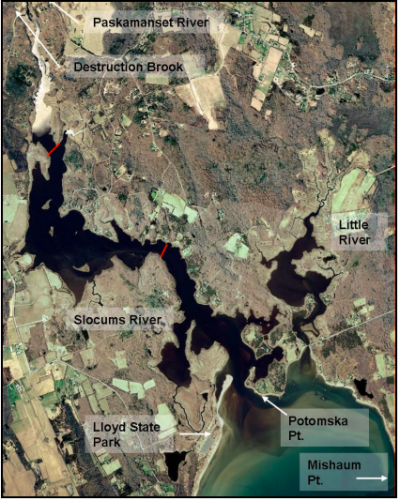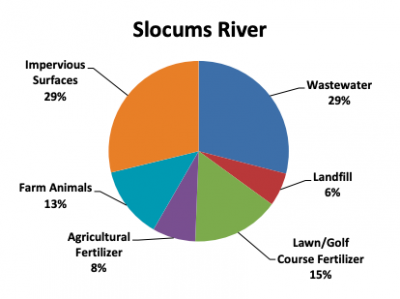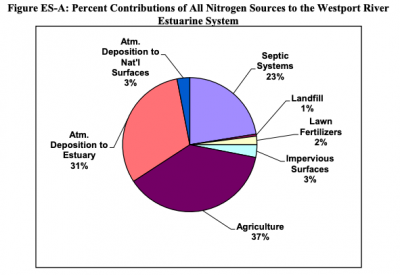State considering changes to septic system regulations
Proposed new state septic system regulations have Dartmouth Health Agent Chris Michaud concerned that owners of more than 2,000 properties in town could be forced to undertake expensive system upgrades within the next five years.
The new rules, which are currently in draft form, are aimed at decreasing the amount of nitrogen flowing into waterways.
Nitrogen, which promotes plant growth, is a key ingredient in fertilizer and is plentiful in septic waste – think human manure. It’s good for golf courses and vegetable gardens, but not good for Buzzards Bay. There, it promotes the growth of algae that blocks sunlight from getting to plants and creatures below the water.
In the most extreme cases, high levels of nitrogen can result in large fish kills since the algae can take up nearly all the oxygen in the water.
“There have already been fish kills in Buzzards Bay because of events like this,” said Korrin Petersen, the Buzzards Bay Coalition’s vice president of clean water advocacy.
Such environmental impacts prompted the state to take action.
The new regulations would require that all septic systems within watersheds feeding into Buzzards Bay be upgraded to active nitrogen removal systems within five years. Such systems generally cost in the $10,000 to $15,000 range.
According to MassDEP, there are about 2,700 homes connected to septic systems in the Dartmouth watersheds that would be affected by the regulation change.
“That is a considerable expense,” Michaud said at a recent Select Board meeting. “Even the lower end numbers of the low five-figure range may not be achievable for our elderly and fixed income [residents] — those that are struggling with historic inflation highs.”
To help alleviate some of that financial burden, the state will allow impacted residents to apply for low-interest loans from their local boards of health for these new systems.
”The only way we protect our coastal waters is through improved wastewater treatment, and we need to make those improvements as affordable as possible,” Petersen said.
Several other communities on Buzzards Bay already have their own requirements for nitrogen-removal septic systems. Marion, Wareham and Westport all require that new and replacement systems near water actively remove nitrogen.
Dartmouth has no such regulation.
While Michaud sounds the alarm, officials from the state’s Department of Environmental Protection and from the Buzzards Bay Coalition point out that the regulations would offer communities an alternative path to address nitrogen pollution.
The town could enter into an agreement with neighboring communities on Buzzards Bay on a variety of nitrogen-reduction programs. Municipalities would have 20 years to reach these goals.
That would give the town more time to reduce the nitrogen flow and more options as to how to do it in conjunction with Westport and New Bedford, which share the impacted watersheds.
Michaud said he knows that, but is skeptical that an alternative path would be open to Dartmouth. Westport already has tougher septic regulations and he said he doubts the city of New Bedford would be willing to pay for a Dartmouth watershed at the expense of residents connected to septic near the regional airport.
“If you can’t align goals through an intermunicipal agreement, as this is summarized to us, then you have to default to the [septic tank] mandate — the horse pill,” he said, meaning that it would be difficult for the residents to swallow.
The health agent and others will have an opportunity to weigh in on the proposed regulations at an as-yet-unscheduled public hearing (or hearings) on the proposal.
A MassDEP fact sheet of the proposed regulation change is attached to this story.














